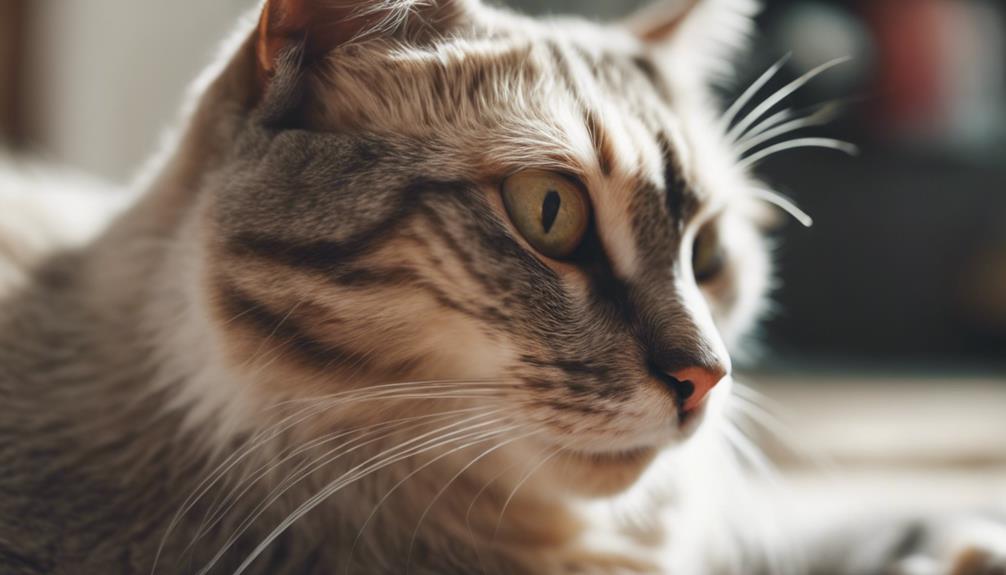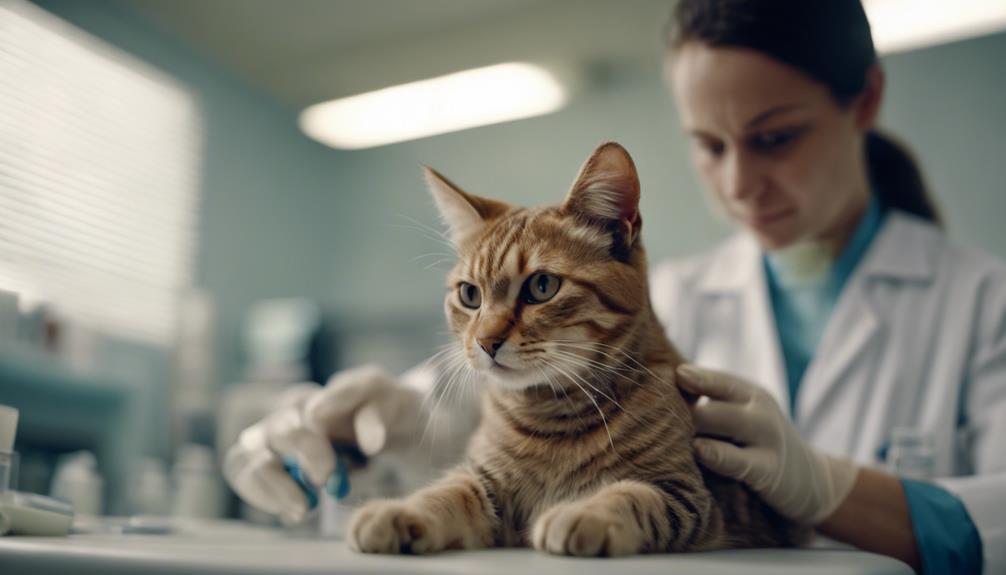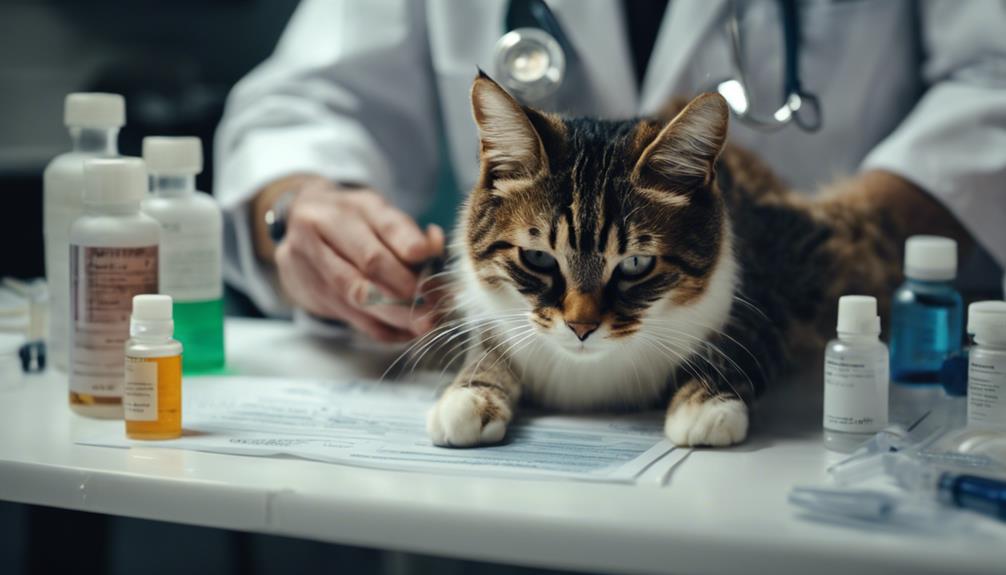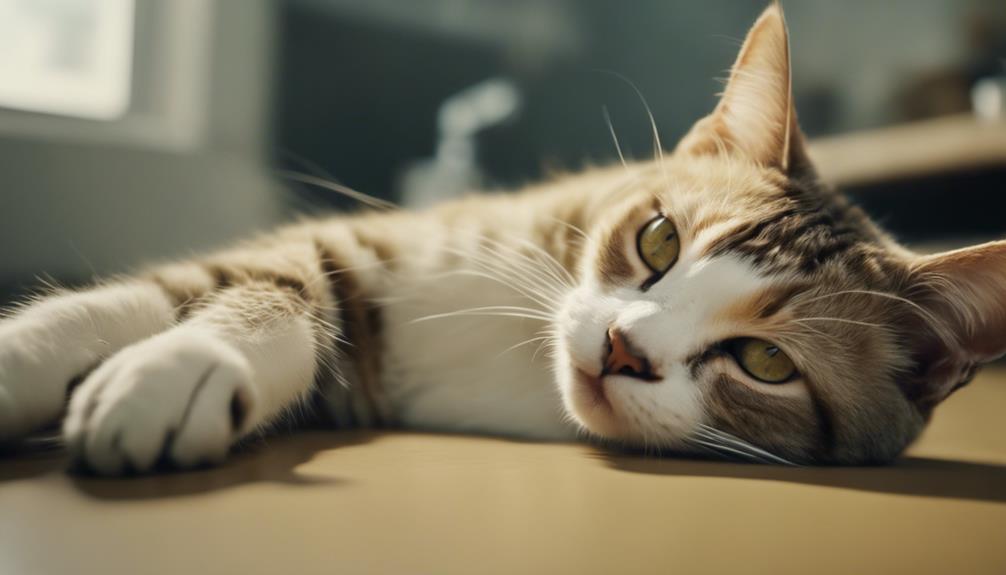Feline Infectious Peritonitis (FIP) remains a perplexing concern in the realm of feline health, presenting a multitude of challenges for both pet owners and veterinary professionals.
The intricate nature of this disease, originating from a mutated feline coronavirus, demands a comprehensive understanding to navigate its complexities adequately.
With no definitive cure in sight, the emphasis on supportive care becomes paramount.
However, there are crucial aspects regarding FIP management that warrant exploration for those invested in safeguarding their feline companions' well-being.
Key Takeaways
- FIP is caused by a mutated feline coronavirus affecting cats, especially those under 2 years old.
- Diagnosis is challenging; definitive confirmation requires tissue biopsy to identify feline coronavirus.
- Treatment for FIP focuses on supportive care and comfort measures due to the lack of a definitive cure.
- Prevention strategies include reducing stress, proper hygiene, and cautious handling in multi-cat households.
FIP Overview
Feline Infectious Peritonitis (FIP) is a severe and often fatal disease in cats caused by a mutated feline coronavirus. This devastating illness affects a small percentage of cats exposed to the virus, with risk factors including a weakened immune system and recent stressors.
FIP can manifest in wet or dry forms, each presenting with specific signs such as a fluid-filled abdomen, breathing difficulties, and sneezing. The virus mutates, evading the immune system and affecting various organs. Diagnosing FIP can be challenging due to overlapping symptoms with other diseases, and treatment options are limited to supportive care for comfort.
Early recognition of FIP symptoms is crucial, prompting immediate veterinary attention for affected cats due to the rapid progression of the disease.
FIP Risk Factors
Exposure to a mutated feline coronavirus is a key factor contributing to the development of FIP in cats. Understanding the risk factors associated with FIP can help cat owners navigate potential threats to their feline companions.
Here are four emotional triggers to consider:
- Helplessness: The unpredictability of FIP development despite best efforts can leave cat owners feeling helpless.
- Heartbreak: Witnessing a beloved cat succumb to FIP can be emotionally devastating.
- Anxiety: Living with the uncertainty of whether a cat may develop FIP can cause significant anxiety.
- Guilt: Owners may experience guilt over potentially exposing their cats to the feline coronavirus unknowingly.
Navigating these emotions while being informed about risk factors is crucial in the fight against FIP.
FIP Signs and Causes

What are the key manifestations and underlying factors of FIP in cats?
FIP, caused by a mutated feline coronavirus, can present as wet or dry forms with distinct signs. Wet FIP progresses rapidly, leading to a swollen abdomen and chest, breathing difficulties, and sneezing.
The causes of FIP include ingestion of feces contaminated with the virus, in utero transmission, and mutual grooming among cats. The mutated virus evades immune responses, resulting in FIP affecting various organs in affected cats.
Risk factors such as a weakened immune system, living in multi-cat households, and recent stressors can increase a cat's susceptibility to developing FIP. Early recognition of these signs and risk factors is crucial for timely veterinary intervention to manage this devastating disease.
FIP Diagnosis Challenges
Challenges in diagnosing FIP stem from the disease's complex manifestations and the limitations of current diagnostic tools. Despite advancements in veterinary medicine, accurately identifying FIP remains a daunting task.
Here are four emotional challenges faced by veterinarians and cat owners when trying to diagnose FIP:
- Uncertainty: The ambiguity surrounding FIP diagnosis can be emotionally taxing, leaving both veterinarians and cat owners feeling helpless.
- False Hope: False positives and inconclusive results can lead to fleeting moments of hope followed by crushing disappointment.
- Guilt: The feeling of guilt can arise when questioning if more could have been done to prevent or detect FIP earlier.
- Heartbreak: The devastating reality of FIP's fatal nature can cause immense heartbreak and emotional distress for all involved.
FIP Treatment Options

Treatment options for FIP in cats focus on providing supportive and palliative care to manage symptoms and enhance comfort. As there is currently no definitive cure for FIP, the primary goal of treatment is to improve the quality of life for affected cats.
Supportive care may include medications to reduce inflammation, alleviate pain, and boost the immune system. Additionally, nutritional support is crucial to maintain the cat's strength and overall well-being. Regular monitoring by a veterinarian is essential to adjust the treatment plan as needed and address any new symptoms that may arise.
While the options for treating FIP are limited, the focus remains on ensuring the cat's comfort and minimizing distress associated with this devastating disease.
FIP Prevention Strategies
Implementing effective FIP prevention strategies is crucial for safeguarding the health and well-being of cats at risk of contracting this devastating disease. To protect your feline companions, consider the following emotional guidelines:
- Create Safe Spaces: Design cozy nooks where your cats feel secure and stress-free.
- Regular Health Checks: Schedule routine vet visits to monitor your cat's overall well-being.
- Nutritious Diet: Feed your cats high-quality food to boost their immune system and vitality.
- Play and Bond: Engage in interactive playtime to strengthen the bond with your cats and reduce their stress levels.
FIP Vaccine Information

How effective is the FIP vaccine in preventing the development of FIP in cats exposed to feline coronavirus?
The FIP vaccine's efficacy remains a topic of debate among veterinarians. While the vaccine exists, its use is not widely recommended due to concerns about its effectiveness. Most cats are exposed to feline coronavirus at a young age, potentially reducing the vaccine's ability to prevent FIP. Additionally, the vaccine may not directly protect against the mutated strains of the virus responsible for causing FIP.
Before opting for vaccination, it is crucial to consult with a veterinarian to assess the risks and benefits based on the individual cat's circumstances. Regular discussions with your vet can help make informed decisions regarding FIP prevention strategies.
FIP Symptoms Recognition
Recognition of FIP symptoms in cats is crucial for early intervention and veterinary care. Being attuned to your cat's health can make a significant difference in managing this devastating disease. Here are four emotional signs to watch for:
- Changes in Behavior: Notice if your cat seems more lethargic, withdrawn, or less interested in play.
- Weight Loss: Keep an eye on any unexplained weight loss, as it could be a sign of underlying health issues.
- Difficulty Breathing: Labored breathing or coughing may indicate respiratory distress.
- Fluid Build-Up: Swollen abdomen or difficulty breathing due to fluid accumulation could signal a more severe form of FIP.
If you notice any of these signs, seek veterinary care promptly to provide the best possible support for your cat.
Immediate Vet Care for FIP

Seeking immediate veterinary care is crucial for cats suspected of having FIP due to the disease's rapid progression and severity. Cats showing symptoms such as weight loss, fever, lethargy, and difficulty breathing should be evaluated promptly by a veterinarian.
Upon suspicion of FIP, diagnostic tests including bloodwork, X-rays, and fluid analysis are essential for confirming the diagnosis. Veterinarians may also recommend a tissue biopsy to definitively identify feline coronavirus.
While there is no FDA-approved cure for FIP, supportive care can help manage symptoms and improve the cat's quality of life. Quick intervention and close monitoring by a veterinary professional are key in providing the best possible care for cats suspected of having FIP.
Managing FIP With Veterinary Support
For cats diagnosed with FIP, veterinary support plays a crucial role in managing the disease's progressive nature and providing necessary care. This support not only helps alleviate symptoms but also offers comfort and improves the quality of life for affected felines.
To evoke emotion in this challenging situation, consider the following:
- Compassionate Guidance: Veterinary professionals offer empathy and understanding during this difficult journey.
- Tailored Treatment Plans: Personalized care plans cater to the individual needs of each cat, ensuring the best possible outcome.
- Continuous Monitoring: Regular check-ups and assessments provide reassurance and allow for adjustments in treatment as needed.
- End-of-Life Care: When the time comes, veterinarians can offer support and guidance in making compassionate decisions for your beloved pet.
Frequently Asked Questions
Can FIP in Cats Be Transmitted to Other Animals Besides Cats?
FIP in cats cannot be transmitted to animals besides cats. Feline infectious peritonitis (FIP) is caused by a mutated feline coronavirus specific to cats. It does not infect humans or other animals. Veterinary advice is crucial for accurate information.
Are There Any Specific Breeds of Cats That Are More Prone to Developing Fip?
Certain cat breeds like Abyssinians and Bengals may have a higher predisposition to developing FIP. However, any breed can be affected. Understanding risk factors, early recognition of symptoms, and prompt veterinary care are crucial for managing this devastating disease.
Is There Any Way to Test if a Cat Is Genetically Predisposed to Developing Fip?
Testing for genetic predisposition to FIP in cats is not currently available. FIP is primarily influenced by the cat's immune response to the feline coronavirus. Focus on preventive measures, early symptom recognition, and supportive care.
Are There Any Alternative or Holistic Treatments That Have Shown Promise in Managing FIP Symptoms?
Alternative or holistic treatments for managing FIP symptoms have limited scientific evidence. Consult a veterinarian for guidance on potential options like acupuncture, herbal remedies, or dietary supplements as part of a comprehensive care plan for affected cats.
How Common Is It for Cats to Survive FIP With Proper Treatment and Care?
Survival rates for cats with FIP are generally poor, even with proper treatment. Due to the lack of a definitive cure, management focuses on supportive care. Early recognition and veterinary intervention are crucial, but outcomes can still be unpredictable.
Conclusion
In conclusion, understanding the complexities of Feline Infectious Peritonitis (FIP) is crucial for pet owners and veterinary professionals alike.
With no definitive cure available, the focus shifts towards providing supportive care to enhance the quality of life for affected felines.
Prevention strategies, early symptom recognition, and prompt veterinary intervention are key in managing FIP cases.
Exploring the nuances of this devastating disease equips individuals with the knowledge needed to make informed decisions regarding their feline companions' well-being.




